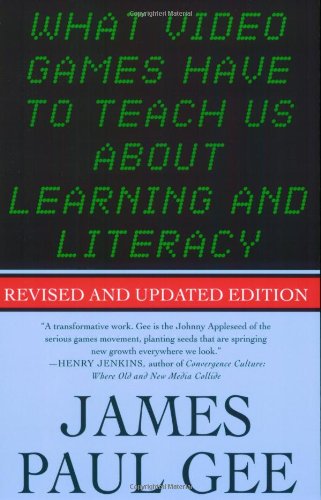What Video Games Have to Teach Us About Learning and Literacy
by James Paul Gee
A Review by Scott finished Dec. 17, 2009
This review will contain spoilers!
In many sentences:
I probably shouldn't have been, but I admit I was surprised when I realized (about 20 or 30 pages in) that Gee wasn't going to be an apologist for video games in this book. Granted, he obviously likes playing them, and doesn't see a problem with playing them, but he doesn't set out to convince anyone that doesn't play games that they should. Instead, he is basically saying "Look, people spend hours learning extremely complex things in video games, in spite of frustration and constant challenge. What is it about games that results in this type of behavior and how can we apply it to school?"
In the end, I think he does a very good job of presenting multiple ways in which aspects of games could be extremely applicable to learning as a whole. I will preface the following with two points: (1) I like video games, so you could easily dismiss the following as me just wanting there to be good aspects of playing games and (2) I am not an educator, but I have spent a lot of time learning, and so that will be the perspective from which I evaluated the validity of Gee's claims.
A major idea that pervaded the book was the even the best game is only a good teaching tool if it is approached in the correct way. One cannot simply sit back and experience the game, but they must consider what it is teaching them, how it is making them think, and why it is good or bad at what it does. By considering these things, and discussing them with others, the experience is no longer passive and active (and at times critical - as Gee would put it) learning is happening. The same could be said about any form of entertainment, but I (and Gee seems to as well) believe games are particularly good at evoking this type of behavior.
One thing that struck me throughout the book was how many of the things Gee mentioned as being effective ways to learn were things that I did, either accidentally or on purpose, on my own to learn in school. For example, the idea of embodying a concept in order to fully understand it, rather than just memorize it, is something I've always done. I will even go so far as to teach myself or others the subject in order to ensure that I really understand what it is about. Games, of course, do this as well when they give you a tutorial in the actual game world, or teach you as you play (Portal). Perhaps I learned this technique from games, or it is why I like games, but it has definitely served me well, and I imagine if it were formally in place in schools it would be super effective.
Another thing that spoke to me: the way games teach you to practice, perfect, and then learn new, more complex strategies to cope with the next challenge, thus starting the practicing and perfection again. Games are excellent at this, and it is exactly what I have always done (though not always in school). I love to find a new subject, learn as much about it as I can, and then move on to the next thing. In fact, that is part of the reason this website exists, and exactly the reason new features are added all the time. The fun in this for me is more the building and experimenting than it is the actual content.
The only aspect of the book that I didn't find very convincing was the chapter on cultural modes. He presents good examples of how games can make you think from a different cultural perspective, but I was not convinced by his argument on how this technique can be useful for learning in general. Maybe this is simply a learning technique that has never been in place for me, or maybe I simply don't learn in that way, but the entire chapter was boring and felt very out of place. Still, it is the only part that struck me in this way.
I found Gee's argument very convincing. I do think video games have a lot to add to the learning experience, and I don't think that is just because I play them and enjoy them. More than any other form of entertainment, they cause people to think, discuss, and engage them in a more active, critical, and intelligent manner. Obviously games are doing something correct in this, so shouldn't we leverage these same techniques to both improve the quality and enjoyment of learning in school?
Favorite Quote
"[G]ood video games build into their very designs good learning principles and ... we should use these principles, with or without games, in schools, workplaces, and other learning sites."
First Line
"I want to talk about video games - yes, even violent video games - and say some positive things about them."
Last Line
"I may well have learned more by writing this book than anyone has by reading it."
What Video Games Have to Teach Us About Learning and Literacy
by James Paul Gee
 Original Publication
Original Publication
Jan. 1, 2007
Paperback edition
Dec. 1, 2007
219 pages